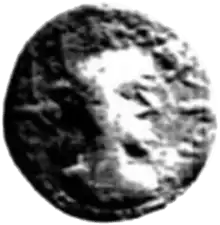| Rhadamsades | |
|---|---|
 Coin of Rhadamsades | |
| King of the Bosporus | |
| Reign | 309–322 |
| Predecessor | Theothorses |
| Successor | Rhescuporis VI |
| Co-regent | Rhescuporis VI (314–322) |
| Born | c. 290 (?) |
| Died | 322 (aged c. 32?) |
| Dynasty | Tiberian-Julian (?) |
| Father | Theothorses (?) |
Rhadamsades (Greek: Τιβέριος Ἰούλιος Ραδαμσάδης, romanized: Tiberios Ioulios Radamsades), also known as Radamsad,[1] Rhadamsadius or Rhadampsadius,[2] was the king of the Bosporan Kingdom, a Roman client state, from 309 to 322. For the last five years of his reign he ruled together with Rhescuporis VI, who became the sole king upon Rhadamsades's death. It is possible that Rhadamsades, perhaps of Sarmatian or Alan origin, is the same person as Rausimod, a barbarian king who invaded Pannonia in 322 and was killed by the forces of Constantine the Great.
Origin
Rhadamsades became king of the Bosporan Kingdom in 309, succeeding Theothorses.[3][4][5] Nothing is known of his origin and relationship to other kings. Like his predecessor Theothorses, his name is of Iranian origin,[1] which could indicate that he was a Sarmatian or Alan tribal leader or nobleman who seized power, rather than a genuine member of the previous Bosporan ruling Tiberian-Julian dynasty.[1][6] The name in of itself is not wholly convincing evidence since the dynasty itself was originally of partly Sarmatian origin.[7] The French genealogist Christian Settipani believes Rhadamsades to have been born c. 290 as a son of Theothorses.[8]
Reign
Rhadamsades shared power with another Bosporan king, Rhescuporis VI,[6] from 314 until the end of his reign.[4][9] Rhescuporis VI's name suggests that he was of Bosporan origin and a genuine Tiberian-Julian dynast.[1] It is not clear whether Rhadamsades and Rhescuporis VI co-ruled in peace or if they were competing claimants.[6] Settipani believes Rhescuporis VI to have been the younger brother of Rhadamsades.[8]
According to the writings of the fifth-century historian Zosimus and the tenth-century emperor Constantine VII, an army of Sarmatians and Maeotians invaded Pannonia in 322 under the command of the king Rausimod, perhaps identifiable with Rhadamsades.[5] Rausimod is said to have been defeated, pursued and killed by the forces of Constantine the Great in 322;[10] the Bosporan Rhadamsades is also known to have died in 322.[3][4][5]
References
- 1 2 3 4 Astakhov, Ivan Alekseevich (2021). "Changes in the Ethnic Pictures and its Impact on the Internal Political Situation in the Bosporus after Rheskuporis VI". Laplage em Revista (International). 7 (3A): 245–252. doi:10.24115/S2446-6220202173A1397. Archived from the original on 2022-09-10. Retrieved 2022-05-07.
- ↑ Minns, Ellis H. (1913). Scythians and Greeks: A Survey of Ancient History and Archaeology on the North Coast of the Euxine from the Danube to the Caucasus. Cambridge: Cambridge University Press. p. 609.
- 1 2 Mitchiner, Michael (1978). The Ancient & Classical World, 600 B.C.-A.D. 650. Hawkins Publications. p. 69. ISBN 978-0-904173-16-1.
- 1 2 3 Frolova, Nina; Ireland, Stanley (1995). "A Hoard of Bosporan Coins in the Period Third Century BC to AD 238 from Ancient Gorgippia (Anapa) 1987". The Numismatic Chronicle. 155: 21–42. ISSN 0078-2696.
- 1 2 3 Astakhov, Ivan Alekseevich (2020). "NOMADIC IMPACT ON THE LATE ANTIQUE BOSPORAN STRATEGY". Revista Inclusiones: 75–83.
- 1 2 3 Nadel, Benjamin (1977). "Literary Tradition and Epigraphical Evidence : Constantine Porphyrogenitus' Information on the Bosporan Kingdom of Emperor Diocletian Reconsidered". Dialogues d'histoire ancienne. 3 (1): 87–114. doi:10.3406/dha.1977.2690.
- ↑ Butyagin, Alexander M. (2007). "The History of the Northern Black Sea Region". In Trofimova, A. A. (ed.). Greeks on the Black Sea: Ancient Art from the Hermitage. Getty Publications. ISBN 978-0-89236-883-9.
- 1 2 Settipani, Christian (2006). Continuité des élites à Byzance durant les siècles obscurs: les princes caucasiens et l'Empire du VI:e au IX:e siècle (in French). Paris: De Boccard. p. 408. ISBN 978-2-7018-0226-8.
- ↑ Vlasov, Vladimir; Smokotina, Anna; Khrapunov, Igor (2013). "The Cultural Layer Overlying the Cemetery of Neyzats". In Khrapunov, Igor (ed.). Exploring the Cemetery of Neyzats. DOLYA Publishing House. ISSN 1893-2134.
- ↑ Wolfram, Herwig (1990). History of the Goths. University of California Press. pp. 60, 402. ISBN 0520069838.